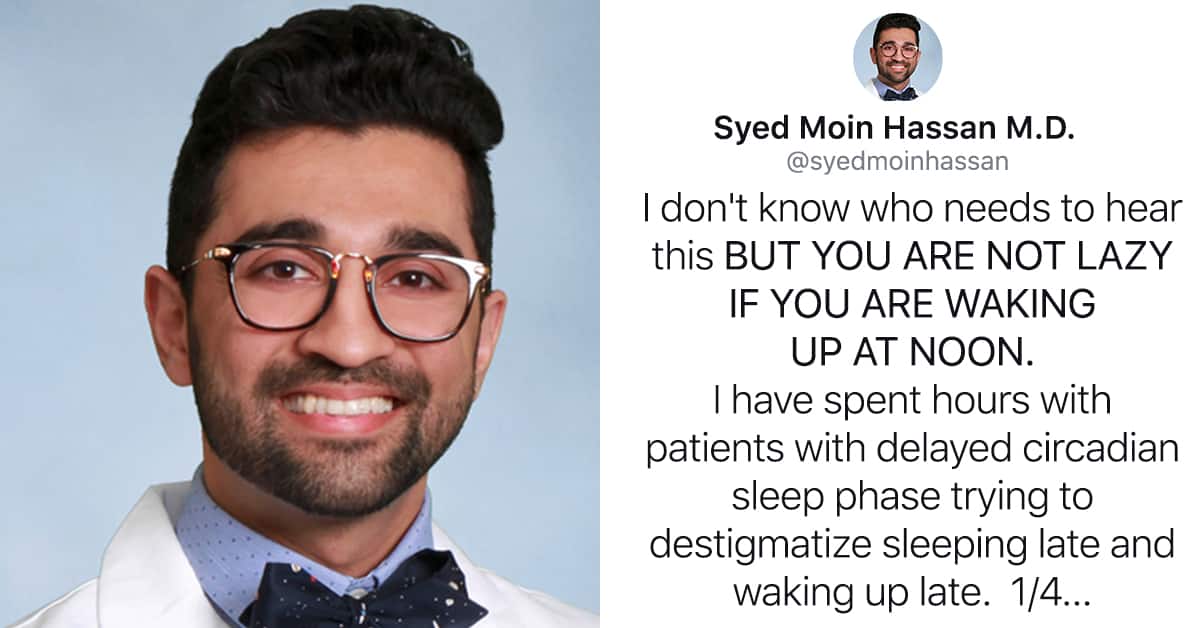This Doctor Is Trying To Destigmatize Sleeping Until Noon For Millennials
The U.S. is a puritanical country and has a puritanical work ethic, which means rising early with the sun, working until dark and then going to bed before you burn through too many sinful candles or “Devil Sticks.” Those values don’t necessarily compute to a modern society, where people work all sorts of jobs in all sorts of time zones, yet most people still feel guilty if they sleep in late. A doctor named Syed Moin Hassan wants to get the word out that sleeping all day is actually normal and even healthy for some people.
In a Twitter thread, he explained that he sees a lot of patients who naturally have delayed circadian sleep rhythms, where going to bed real late and subsequently waking up late feels good to them.
“I don’t know who needs to hear this BUT YOU ARE NOT LAZY IF YOU ARE WAKING UP AT NOON. I have spent hours with patients with delayed circadian sleep phase trying to destigmatize sleeping late and waking up late,” he started.
I don’t know who needs to hear this BUT YOU ARE NOT LAZY IF YOU ARE WAKING UP AT NOON. I have spent hours with patients with delayed circadian sleep phase trying to destigmatize sleeping late and waking up late. 1/4
— Syed Moin Hassan, M.D. (@syedmoinhassan) March 1, 2020
He then shared a story of a young patient who was convinced he was lazy because his body wanted to sleep in. He’d never heard of circadian sleep patterns and was feeling unwell enough to be at the doctor’s office, so he probably needed to hear it.
From a young age he has been told that that waking up late was a sign of laziness and he was terrified of even thinking about sleeping in and would feel ashamed if he woke up late. 3/4
— Syed Moin Hassan, M.D. (@syedmoinhassan) March 1, 2020
Hassan said there are two pattern extremes:
People at extremes of circadian rhythm either sleep really early and wake up early (advanced circadian sleep phase) or sleep really late and wake up late (delayed circadian sleep phase).
Then he tried to answer a question from another doctor, who asked, “How do we differentiate if it’s a genuine medical condition. The difficulty is that half of the productive day has passed by for majority. Especially for people in the regular jobs.”
To answer @drgsreddy. A good patient history eliciting an inability to fall asleep,preference to stay awake at night & wake up late during days off & difficulty waking up early morning is indicative of a delayed CRSWD. pic.twitter.com/Qu5FiNyNPo
— Syed Moin Hassan, M.D. (@syedmoinhassan) March 2, 2020
Actigraphy and melatonin assays can be done to further assess. However these are available in limited locations. Treatment can be either aligning your social life with your circadian phase. Or trying to align your circadian phase, using light & melatonin, with your social life.
— Syed Moin Hassan, M.D. (@syedmoinhassan) March 2, 2020
There are ways to adjust your circadian rhythm with melatonin and light therapy, which is necessary for some folks with regular 9-5 jobs. There were a lot of people in the comments who seemed to think the best thing to do was accept your natural sleep cycle and find a way to live by it. It’s the world that’s wrong for trying to force everyone in the same box:
It’s a culture war. We have this ideology around rising early equalling virtue and productivity, at least in the US (I assume Canada too). And it’s totally not true, but our cultural norms, workplaces, and special events all tend to be scheduled around it.
— 🔞 Seattle Femdom: Dominatrix Katherine Control (@SeattleFemdom) March 2, 2020
I have fought against my delayed circadian rhythm my whole life. My motto: “the late worm avoids the early bird” 🐛 🐦
— William Morrison, MD (@morrisonMSK) March 2, 2020
I’m usually up at 11p-2a writing and building things until my eyes give out, sleep a decent night’s rest, and up for brunch in the morning.
I’m getting plenty of sleep, just shifted later. Why is that a problem? pic.twitter.com/etU1nO53l4
— Blake the Drake (@SmutWithPlot) March 2, 2020
SAME.
— Kristen Cincotta (@kscincotta) March 2, 2020
Also going to bed before midnight feels too early
— TipsyGnostalgic (@StripedRoxy) March 2, 2020
My natural sleep cycle is like 12-1 AM to 7-8 AM, give or take
If I’m in withdrawal from my ADHD meds I often go several days of sleeping 12-14 hours
— Serenity “Unusually Long Femurs” Dee (@sapphixy) March 2, 2020
FWIW, these are exactly my “ideal” times too. I find I have peak processing and energy between 10pm-11pm. I have found that getting at least 8 hours a night, every night, helps to make mornings a little bit easier…
— Devin DiGiovanni (@dev_digi) March 2, 2020
This. I do all my best writing, thinking, and work in the evening and night. I’m sharper and far more focused.
— ♔ Julia Lynn Rubin 🌈 (@julialynnrubin) March 3, 2020
It’s true. If only society could shift it’s expectation that ‘work’ happens from 9-5 Mon-Fri, productivity could shift monumentally, accommodate a variety of needs, alleviate daycare burdens AND even make ‘rush hour’ obsolete. Wouldn’t it be nice if traffic moved at ALL hours?
— Amy Starkey (@AmyEStarkey) March 2, 2020
As someone who can’t help but wake up at the crack of dawn, changing my sleep patterns sounds almost as great as self-acceptance. Make the choice that feels best for you and don’t be afraid to ask for help.
More stuff about millennials:
- Who’s The Snowflake? Study On Narcissism Finds Baby Boomers Are More Sensitive Than Millennials
- Sorry But Millennials Are Now Wise Old Elders (27 Tweets)
- Gen-Z Teens Are Sharing All The Ways Millennials Are Out Of Touch
- Millennials Are Mocking The Elderly And Out-Of-Touch With “OK Boomer” Memes (30 Memes)

